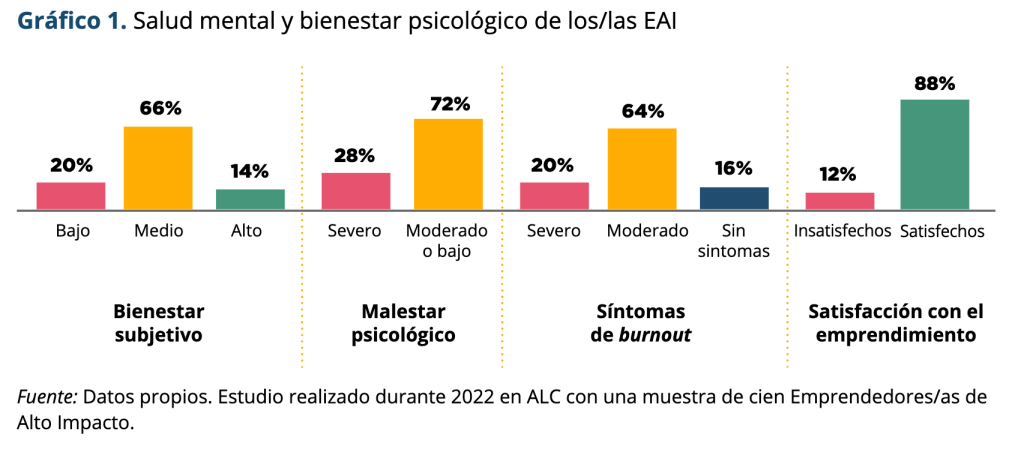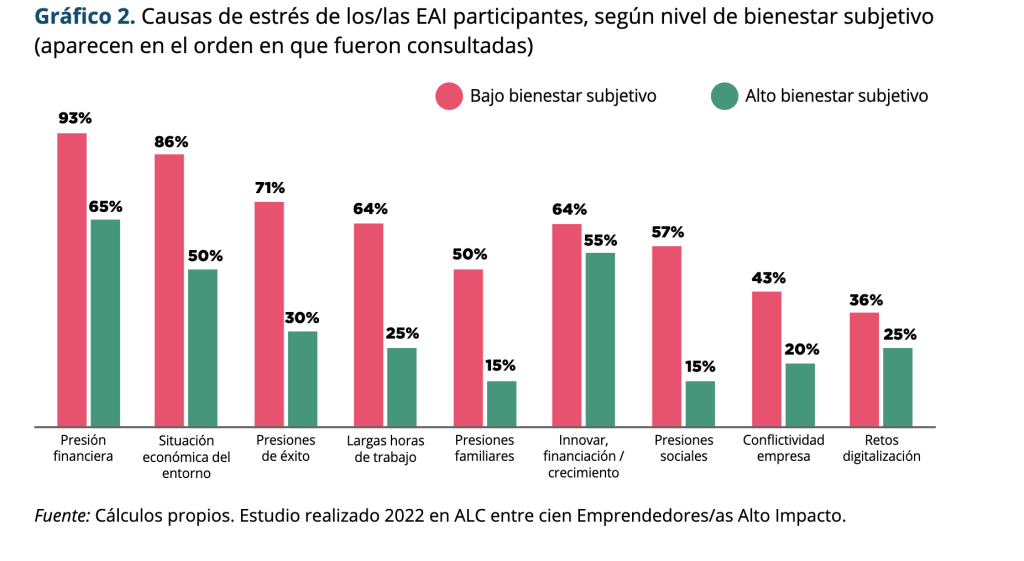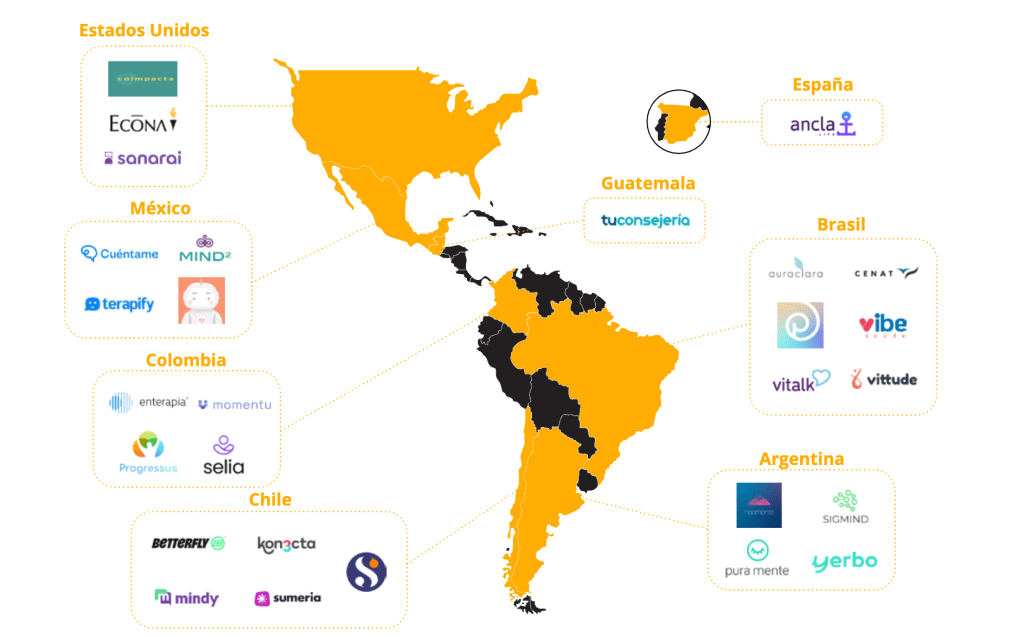The finding is part of his publication “The Invisible Factor”, an exploratory study based on interviews with a diverse group of founders, to understand and make visible the situation of well-being and mental health in the high-impact entrepreneurial ecosystem.
Becoming a high-impact entrepreneur in Latin America demands great sacrifices. For the IDB Lab, being one is similar to high-performance athletes, in the magnitude of the challenges they face, as well as in the abilities and skills, in a certain way understood as extraordinary, that they must display.
Subscribe to our newsletter
The outstanding growth of the ecosystem in the region (in 2021 it received record financing of US$19.5 billion) has generated an environment of high tension and uncertainty among entrepreneurs to be able to maintain or grow their initiatives without neglecting the work commitment with their teams, explains the study. “The fact that this personal challenge often seems invisible and is usually faced alone, due to stigma or prejudice, makes the sector much more prone to suffering well-being and mental health ailmentssuch as states of anxiety, fatigue, depression or general exhaustion (burnout syndrome), compared to the general population”, he adds.
For the innovation laboratory, these high-impact ventures are an essential part of the dynamic economies of our countries. “However, in many cases, these entrepreneurs face very particular circumstances and challenges in the region. Added to the daily pressures associated with financial, operational or sustainability factors are highly changing political, economic and social contexts.as well as recently the harsh impacts of COVID-19, which demonstrated the need and relevance of making visible and addressing the issue of well-being and mental health, a topic that has been absent from the public agenda in Latin America and the Caribbean for a long time.”
In order to review the current situation, the IDB Lab conducted an exploratory study, between October and December 2022, using quantitative and qualitative methodologies and identified a sample of 400 high-impact entrepreneurs who could represent the diversity of the regional ecosystem to reflect what potentially affects a greater part of the ecosystem.
As a general finding in this research exercise, the IDB Lab confirmed that “a current situation is reflected in high-impact entrepreneurs in the region that would be generating an affectation related to their psychological and subjective well-being, showing differentiated levels in terms of psychological discomfort, burnout symptoms and satisfaction with their endeavors”.
In Tekios We show these indicators and findings and reproduce the mapping of the initiatives (organizations and startups) that have been created in the region to attack this problem.
MENTAL HEALTH, A PENDING ISSUE
A 2022 study on burnout by the Betterfly company, which surveyed 4,000 workers in the region in seven countries (Argentina, Brazil, Colombia, Chile, Ecuador, Mexico and Peru, plus Spain), showed that 54% of employees suffer from job burnout and that this is having different impacts on their lives.
Speaking specifically of the world of entrepreneurship, a study carried out by Ute Stephan, a researcher at King’s College (2018), on the mental health and well-being of entrepreneurs, discusses how entrepreneurs face extreme working conditions, in which the high levels of uncertainty, responsibility and complexity end up being very important stressors, along with time pressures and very long working hours. Entrepreneurs often experience these job characteristics as overwhelming and value them as threatening.
By trying to be more stress resistant to achieve their goals and high impact results, the people in charge of the initiatives can in many cases enter a complex cycle of pressures related to the high standards that are demanded of them in many cases by shareholders, investors , incubators or accelerators, as external actors interested in the success of the venture; they frequently end up assuming very high costs in terms of mental health and personal well-being, says the same study by Stephan that cites the IDB Lab publication.

From the well-being approach, the study shows that 64% of the participating high-impact entrepreneurs have moderate levels of burnout; 20% have clear symptoms of severe burnout and 3 out of 10 entrepreneurs show symptoms of psychological discomfort.
100% of these with low subjective well-being present severe symptoms of psychological discomfort, while the incidence is only 30% in high-impact entrepreneurs with high well-being. Symptoms of psychological distress include stress, insecurity, apathy, feeling overwhelmed, difficulty coping with daily tasks, difficulties stopping or setting limits to work hours, and low energy level.among others.

Between The most prominent causes of stress are, firstly, financial pressure or raising capital (73%), followed by pressure to innovate in business models, financing and growth (61%), the economic situation of the environment ( 61%), taking advantage of long working hours (53%) and the pressure for success in sales or scalability to new markets (50%).
The most common strategy identified that participating high-impact entrepreneurs use to attend to their well-being and some elements of mental health, especially to deal with stress and burnout syndrome, has to do with lifestyles (84%).
“It especially helps them to exercise, listen to music, read, walk, sleep more and better, eat healthier and reduce coffee, alcohol or tobacco. The second most used strategy is social connection (32%), which includes spending time with family, partner, friends, doing group activities online or in person, participating in thematic interest groups or hobbies. This is followed by practices of spirituality and religiosity (30%), including doing yoga, meditation, praying or attending religious ceremonies, and some do therapy and psychotherapeutic work with specialists to recognize their emotions (27%)”, adds the study.
The IDB Lab Study provides some final reflections and recommendations for an initial work agenda on mental health in the region: i) there are general levels of affectation in High Impact Entrepreneurs in the region in terms of well-being and mental health, but it is key to differentiate them; ii) it is necessary to promote more research and data collection to increase visibility and impact; iii) it is key to expand investment in well-being and mental health issues in the region; iv) it is necessary to promote that actors of the entrepreneurial ecosystem in the region have higher levels of awareness, involvement and proactivity; as well as v) understanding that sharing good practices, encouraging the creation of habits and promoting the provision of services tailored to the needs of EAIs can make a difference.
INITIATIVES THAT HELP
Addressing and financing wellness and mental health issues, for those who lead initiatives, incubate them, accelerate them or invest in them, is good business, affirms the IDB Lab Study.

Various organizations and startups, with different approaches and business models, are offering specialized products and services. They are focused on prevention or awareness strategies, offer specialized medical and professional assistance, and seek to reach specific audiences or the general population. Something very important for these initiatives has been the role of technology, says the study.
“Through digital platforms, mobile apps, chatbots, artificial intelligence, or other tools, many have been able to expand their reach, facilitate access, close care gaps for vulnerable populations, and scale their impact,” he says.
Four Mexican companies can be found in the Bid Lab mapping (Yana, Terapify, Mind2, Tell me), a Guatemalan (yourcounseling), three Americans (Sanarai, econa, co-impacts), a Spanish woman (Anchor), four Colombians (selia, Progressus, momentum, In therapy), six Chilean (sumerian, simplehealth, hello, mindy, kone3cta, betterfly), six Brazilian (vittude, Vitalk, vibe, positiveapp, dinner, auraclara) and two Argentines (weed, sigmind).
“These were created or promoted by some agent of the entrepreneurial ecosystem, to attend to the well-being and mental health of companies or other entrepreneurs; offer comprehensive products or services that promote an organizational culture for mental health and wellness, including special and personalized support strategies; and they use some type of technology (digital platform, mobile application, chatbot, among others) to have a greater reach and break down access barriers”, explains the study.
You can check here the publication that, at the end, offers a complete description of each of these organizations that are part of the mapping.
Subscribe to our newsletter

